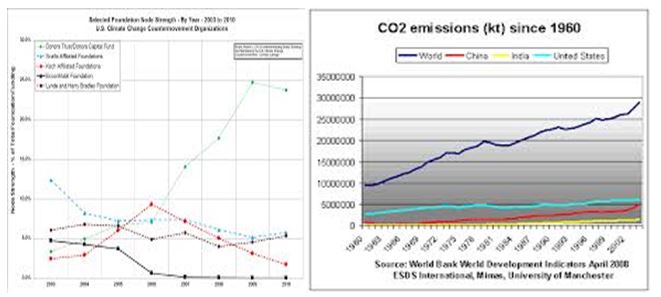The relationship between climate change and international trade has been on a great verge of developing a new critical issue. This was so evident at the Conference of Parties (COP 17) Climate Conference that took place in Durban, South Africa; the November-December 2011 conference focussed on selected imperative issues that often arise when issues of international trade policies crisscross climate change facets (Ahmed n.pag). The two aspects have a connection that is developing rapidly.
However, the interface is not stated in the initial guidelines of the World Trade Organisation (WTO) and the General Agreement on Tariffs and Trade (GATT). Undoubtedly, for successful implementation of climate change eradication programs, the WTO and GATT have to recognize the underlying issue that emanates between the two crescendos.
For instance, as a way of combating environmental degradation from a global perspective, international trade must deal with environmentally friendly commodities. This reveals a clear relation or line that exists between climate change and international trade.
At the COP 17 meeting in Durban, the WTO identified key measures that member nations should adopt in order to ensure the sustainability of the international trade. For sustainability to be a common denominator in international trade, to adopt environmentally friendly technologies, to practice climate protectionism, to adhere to unilateral trade measures, and to use biofuels become universal factors for all nations.
So related are the two aspects that all international summits or conferences have to discuss the modalities of ensuring the sustainability of world projects. The Kyoto Protocol, for instance, has numerous obligations to developed and developing nations to reduce their greenhouse gases emission levels (Trade and Climate Change par. 9). In the course of processing and manufacturing goods for exports, different nations create some impact on the environment.
Therefore, it is the responsibility of international and local trade organizations to design modalities, which will enhance business continuity. From this analogy, international trade and climate change have a clear interface that cultivates new international issues. Countries like South Africa, China, and Brazil have moved swiftly to support the implementation of the Kyoto Protocol, as well as strengthen unilateral trade measures.
A key regional block, like the EU, formed majorly for trade issues, have embarked on an emission trading system, in which it buys carbon from developing nations. The move is interpreted as a protectionist measure by unindustrialised nations. The trading dilemma for developing countries has been the border measures, which may negatively affect their export sectors, especially the export attractiveness of their energy-exhaustive divisions (Low et al., par. 7).
To remove the discriminatory border measures, developing countries propose the use of ecologically pleasant technology transfer. India, for instance, has objected the Unilateral Trade Measures (UTMs), which developed nations adopted.
The country holds that UTMs are likely to be discriminatory restrictions on developing countries in engaging in international trade activities; the measures contravene the ‘principle of common but differentiated responsibilities’ as encrypted in the provisions of the United Nations Framework Convention on Climate Change (UNFCCC) (Ahmed n.pag). At the same time, the UTMs breach the WTO principles of non-discrimination, as well as obstructing the efforts of reinforcing multilateralism.
International trade has attracted the use of environmentally friendly technologies. For example, India had made a proposal for the formation of a global association of Climate Innovation Centres (CIC) to aid in developing, transferring, and deploying ecologically pleasant technologies for domestic and international use.
According to Carbon Trust and UNFCCC, CIC will enable developing nations to have the capacity to address the challenges of environment-friendly technologies, thus making its transfer more affordable (Low et al. par. 11).
As a way of supporting the conservation of the global environment, developed nations ought to assist unindustrialised states in adopting environmentally friendly approaches. Such support will increase the involvement of underdeveloped nations in international trade.
For instance, understanding the effects of climate change on agricultural trade and the use of biofuels is significant to least developed nations, as it helps in providing a common position to the changing multilateral trading arrangement. The graphs below are from the WTO’s website; they indicate the changes in CO2 levels.

Works Cited
Ahmed, Faisal. “The international trade climate change interface is emerging as a ‘new issue’.” The Economic Times [New Delhi] 2012: n. pag. Web.
Low, Patrick, Gabrielle Marceau, and Julia Reinaud. The Interface between the Trade and Climate Change Regimes: Scoping the Issues. N.p., 2011. Web.
Trade and Climate Change. N.p., 2013. Web.